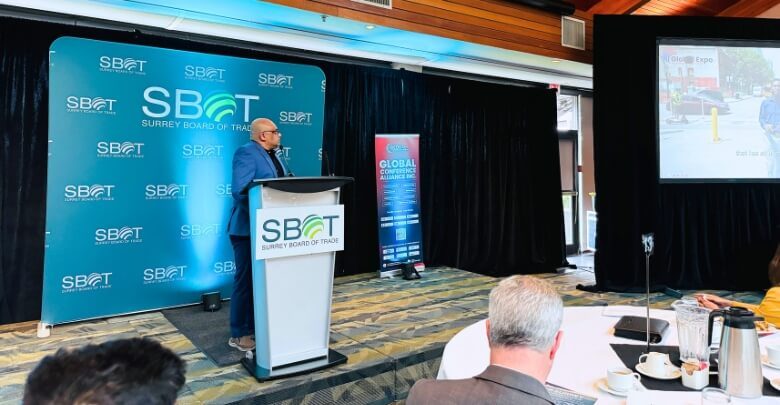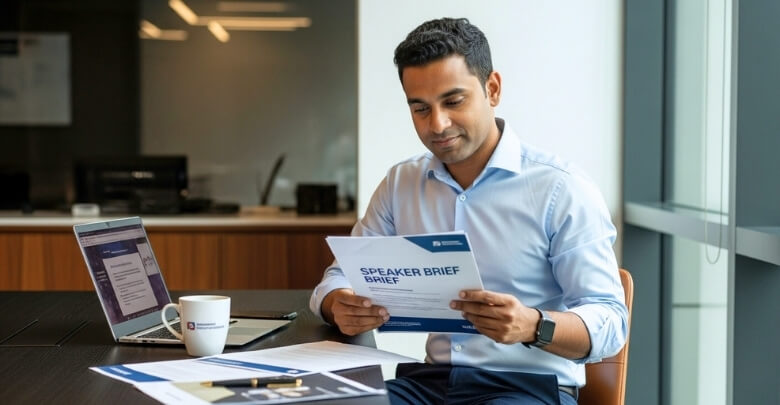Preparing to speak at a conference is exciting, but it comes with responsibilities that go beyond stepping on stage. The way you prepare, present, and connect with people can shape how the audience experiences the entire event. As a speaker, you set the tone, share insights, and leave a lasting impression.
So, what is the purpose of a conference speaker checklist? In simple words, it’s a guide to help you prepare every step, from understanding your audience to managing technical details. This keeps you organized and ensures your talk runs smoothly without last-minute stress.
With the right checklist, you’ll feel confident, stay on track, and deliver a session that inspires. Keep reading to see how you can use the Conference Speaker Checklist to prepare effectively and create a meaningful experience for your audience.
Conference Speaker Checklist
A strong presentation doesn’t happen by luck. As a speaker, you need to prepare carefully so your message connects with the audience and supports the event’s goals. This checklist helps you cover every stage of preparation, from planning your content to following up after the event.
Checklist:
- Understand your audience and goals
- Highlight your expertise and relevance
- Showcase past feedback and credibility
- Clarify your availability and terms
- Respond professionally to invitations
- Ask for clear expectations
- Confirm technical and logistical needs
- Join rehearsals and follow the run-of-show
- Request feedback and follow up
Following this approach helps you stay professional, avoid unnecessary stress, and position yourself confidently among a trusted conference speakers list.

Understand Your Audience and Goals
Know who you’ll be speaking to, their roles, experience level, and expectations. Define three clear takeaways you want them to remember. This preparation is important when presenting at events like business, healthcare, or educational and professional conferences, where organizers consider what to look for in a conference speaker who can connect with diverse groups.
Highlight Your Expertise and Relevance
Showcase how your background directly supports the conference topic. Update your bio, slides, and professional profiles with relevant achievements or past speaking experience. Demonstrating why your perspective matters builds credibility and ensures both organizers and attendees see the value in what you bring, setting you apart from other potential speakers.
Showcase Past Feedback and Credibility
Positive testimonials, reviews, or clips of past talks strengthen your standing as a speaker. Sharing event speaker details such as ratings, audience comments, or highlights proves your ability to engage people and deliver value. Reflecting on this feedback also helps refine your skills for future conferences.
Clarify Your Availability and Terms
Make your availability clear early on to avoid scheduling conflicts. Speaker availability is often confirmed months in advance, so communicating early helps both you and organizers. Be upfront about fees, travel needs, or accommodations to ensure a smooth, professional process.
Respond Professionally to Invitations
When you receive an invitation, reply promptly and respectfully. Confirm important details such as the topic, format, and session length. If something isn’t clear, ask questions politely. A professional response sets the tone for collaboration and ensures the organizer feels confident about working with you.
Ask for Clear Expectations
Don’t assume anything about your session. Request a one-page overview of audience details, deadlines, technical setup, and session format. Knowing these in advance gives you clarity and helps you prepare effectively. This also reduces last-minute stress and keeps both you and the organizer aligned.
Confirm Technical and Logistical Needs
Communicate your AV requirements clearly, like microphone type, slide format, or playback needs. Always prepare a backup version of your slides. Testing these in advance avoids surprises during your talk. A smooth technical setup keeps the focus on your content instead of preventable disruptions and strengthens the conference speaker lineup.
Join Rehearsals and Follow the Run-of-Show
Take part in rehearsals even if you’re experienced. Rehearsals give you a sense of timing, stage layout, and technical flow. Review the run-of-show to know exactly when you’ll speak, how long you have, and how Q&A will be handled. Preparation boosts your confidence on stage.
Request Feedback and Follow Up
After your session, ask for audience or organizer feedback. Reflect on what worked and what you could improve. Send a thank-you message to the organizer and stay in touch for future opportunities. Following up leaves a positive impression and helps you grow as a speaker.
This checklist isn’t just about preparation; it’s about building confidence, clarity, and professionalism as a speaker. By following these steps, you’ll deliver talks that inspire, connect with your audience, and strengthen your reputation for future events.
Define Your Target Audience and Goals
Every impactful presentation starts with knowing exactly who will be in the room and what they should gain from your session. Without this clarity, even a strong talk may not fully connect. As a speaker, this step helps you shape your content so it feels meaningful and relevant.
Identify Audience Demographics
Take time to understand who you’ll be speaking to. Note their job roles, industries, and level of experience. Are they students, entry-level employees, or senior leaders? Adjusting your examples and language based on these details ensures your message connects with the people who attend the conference and keeps them engaged throughout.
Document Three Key Takeaways
Decide on three main points you want your audience to remember once your session ends. Keeping it to three makes your talk more focused and impactful. These could be actionable strategies, fresh insights, or tools they can apply immediately in their work or studies.
Align Your Topic With Conference Goals
Make sure your presentation ties into the event’s overall theme. If the conference focuses on innovation, your content should explore new ideas or forward-looking strategies. When your talk reflects the larger goals, it feels more connected to the event and offers clear value to attendees.
Example
If you are speaking to mid-level managers, share practical leadership tactics they can apply, rather than sticking to broad theories. Matching your content to the audience’s real challenges helps them stay engaged and ensures your talk feels useful and relevant.
Defining your target audience and goals is more than preparation; it’s the foundation of your success as a speaker. Once you get this part right, every other step in your checklist becomes easier, and your session becomes far more effective.
Research and Evaluate Your Own Speaking Approach
Selecting the right style and content for your talk isn’t just about showing expertise; it’s about making sure you deliver value to your audience. As a speaker, you need to look closely at your own skills, strengths, and delivery style to confirm they fit the event’s theme and expectations. The following steps will help you assess your approach and prepare more effectively:
Look for Relevant Experience and Expertise
Reflect on your background and ensure your topic highlights your strongest areas of knowledge. Share examples from past projects, case studies, or experiences that prove your authority. This makes your presentation credible and shows the audience that you’re speaking from real-world expertise rather than just broad theory.
Showcase Testimonials and Reviews
If you’ve spoken at events before, collect and share feedback from organizers or attendees. Positive testimonials prove that you can hold attention and deliver valuable insights. For newer speakers, seek feedback from smaller engagements, webinars, or team presentations to highlight growth and demonstrate your commitment to constant improvement.
Confirm Your Schedule and Commitments
Before saying yes to an event, make sure your schedule is clear. Overlapping commitments can create unnecessary stress and reduce the quality of your delivery. Discuss your availability with organizers early and set clear expectations about your involvement, including travel time and preparation needs, so you can stay fully focused.
Evaluating your expertise, credibility, and availability helps you prepare with confidence. By knowing your strengths, presenting feedback from past talks, and committing to realistic schedules, you position yourself as a reliable and engaging speaker who adds real value to the event.
How Should You Respond to Speaking Invitations Professionally?
When you receive an invitation to speak, your response shapes the first impression. Reply promptly, thank the organizer, and confirm your interest in learning more about the event. A polite and professional tone shows respect for their effort and positions you as a reliable speaker who is easy to work with. These tips will guide you in replying professionally:
Clarify Session Details Early
Don’t leave anything to assumption. Ask about the session type, timing, and audience expectations. Confirm whether you’ll deliver a keynote, panel talk, or workshop, and request clarity on the length and Q&A. Getting this information upfront ensures your preparation stays aligned with the organizer’s vision and the audience’s needs.
Be Transparent About Fees and Terms
Discuss honorariums, travel coverage, or accommodation arrangements early in the process. Transparency builds trust and avoids confusion later. Whether you’re paid or volunteering, knowing what’s covered allows you to plan confidently. It also helps organizers respect your time and ensures both sides are comfortable with the agreement.
Review Rights and Deliverables
Before finalizing, clarify what materials you’ll need to submit, such as slides, bios, or photos, and by what deadlines. Ask about recording or streaming rights and how content will be shared afterward. Confirming these points protects your work, prevents misunderstandings, and creates a smoother collaboration for both sides.
Sample Reply Email for Speakers
Subject: Re: Invitation to Speak at [Conference Name]
Hi [Organizer’s Name],
Thank you for the kind invitation to participate in [Conference Name] on [date]. I’d be glad to learn more about the audience, session type, and expected timing so I can prepare effectively.Could you also confirm details about honorarium, travel, and presentation requirements?
Looking forward to your reply.
Best regards,
[Your Name]
Outreach and negotiation from your side as a speaker are about clarity and professionalism. By responding promptly, setting clear expectations, and confirming terms early, you build trust with organizers and free yourself to focus on delivering a strong presentation.
How to Communicate Effectively With Organizers?
Clear communication with organizers is one of the most important parts of preparing for your talk. Even experienced speakers benefit from knowing exactly what is expected. From deadlines to technical details, asking the right questions early helps you avoid surprises and ensure a successful presentation that leaves the audience engaged. Here is how you can communicate effectively with organizers:
Request a Speaker Brief
If the organizer hasn’t shared one, ask for a one-page document with all essentials. This should include audience details, session format, deadlines for materials, and AV setup. Having this information in writing keeps you confident, avoids miscommunication, and ensures your preparation aligns with the event’s expectations.
Clarify Session Format and Timing
Don’t assume the structure of your presentation. Confirm how much time you have, whether Q&A is included, and what type of session you’re delivering — keynote, workshop, or panel. Knowing this upfront helps you design your content properly and prevents rushing or running over your allotted time.
Confirm Technical Arrangements
Technical issues can quickly disrupt a presentation, so confirm these details in advance. Ask which microphone you’ll be using, the slide format required, and whether audio or video playback is supported. Request a rehearsal if possible to test everything and reduce stress on the actual day.
Personal AV Checklist
- Microphone type (lapel, handheld, or headset)
- Slide format (16:9 or 4:3)
- Clicker and monitor availability
- Audio or video playback setup
- Backup slides in PDF
- Recording and streaming rules
Maintain an Open Communication Channel
Know who your point of contact is and keep their details handy. Whether it’s for sharing slides, asking questions, or handling last-minute changes, staying in touch with one person avoids confusion. A direct channel also gives you confidence that help is available if needed.
Effective communication with organizers gives you the clarity and support needed to deliver your best performance. By requesting details, confirming expectations, and staying connected, you set yourself up for a presentation that feels smooth, professional, and impactful.
Accessibility, Inclusion, and Diversity Checklist
As a speaker, your role goes beyond delivering information; you also help shape how inclusive and welcoming the event feels. By making small but thoughtful adjustments, you can ensure your talk is accessible to all participants and respectful of different identities and perspectives, as expected from leading communication speakers for conferences. Keep these steps in mind to make every attendee feel included:
- Use Clear and Inclusive Language: Avoid jargon or narrow references that may exclude people. Choose examples representing different backgrounds and experiences, ensuring your message resonates widely and helps every participant feel acknowledged and respected.
- Provide Materials In Advance: Share your slides or handouts ahead of time so attendees using accessibility tools, translation software, or additional preparation can follow smoothly. This allows for better engagement and a more inclusive session.
- Describe Visual Content Clearly: When presenting charts, photos, or videos, explain them aloud. This ensures participants with visual impairments or those seated far away can fully understand your content, reinforcing your key points for everyone.
- Respect Pronouns and Identity: Introduce yourself with your pronouns and respect those of others. Avoid assumptions about audience members’ identities, creating a safe, professional, and respectful environment for all attendees in your session.
- Support Diverse Perspectives: Incorporate stories, examples, and case studies from various cultures, genders, and professional backgrounds. This approach makes your presentation more engaging and relevant while showing respect for different perspectives in your audience.
Accessibility and inclusion build stronger connections with your audience. By following these steps, you show respect for all attendees and make your presentation meaningful for everyone in the room.
Tips to Evaluate Your Conference Performance
Your role as a speaker doesn’t end when you leave the stage. Taking time to evaluate your own performance helps you improve for future events. By reflecting honestly, you’ll strengthen your skills and become more effective with each presentation, making you stand out in programs featuring diverse conference topics and speakers. Here are simple ways to evaluate your performance:
Collect Audience Feedback
Ask the organizer for audience surveys or informal feedback after your session. Look at ratings for clarity, engagement, and relevance, and review open comments. These insights show how well your talk resonated and highlight areas where you can grow.
Reflect on Delivery and Timing
Think about how you managed your time, tone, and pacing. Did you keep within the allotted slot? Were your explanations clear and engaging? Self-reflection on delivery ensures you understand how effectively you communicated your key ideas.
Assess Audience Engagement
Consider how the audience responded during your talk. Did they ask thoughtful questions, participate in discussions, or show interest through their body language? Observing engagement helps you measure the connection you built and the impact your presentation created.
Review Your Visuals and Content
Take a critical look at your slides, examples, and stories. Were they simple, clear, and directly supportive of your points? Assess whether your visuals enhanced understanding or distracted from your message, and adjust for future presentations accordingly.
Follow Up With Organizers
After the event, send a thank-you note and request any formal evaluation results. Ask the organizer if there’s feedback on logistics or content. Staying in touch shows professionalism and keeps you in mind for future opportunities.
Self-assessment isn’t about being overly critical; it’s about learning. By reflecting on feedback, delivery, engagement, and content, you prepare yourself to deliver stronger, more impactful talks at your next conference.
Common Mistakes and How to Prevent Them
Even experienced speakers can make mistakes that weaken their impact. Recognizing these pitfalls early allows you to avoid them and deliver a stronger, smoother session. Here are some of the most common errors and how to prevent them:
Submitting Materials Late
Delaying your slide or bio submission creates stress for organizers and limits your preparation time. Always respect deadlines by preparing materials early. This gives you more time to rehearse and helps organizers support your session effectively.
Overlooking Technical Preparation
Technical issues like wrong slide formats or microphone troubles can disrupt your talk. Confirm AV details in advance, test equipment during rehearsals, and bring backups. Preparing for these details ensures your presentation flows smoothly without unnecessary interruptions.
Ignoring Time Limits
Running over your allotted time can throw off the event schedule and reduce audience attention. Practice your talk with a timer and adjust your pacing. Sticking to time limits shows professionalism and respect for your audience.
Using Vague Agreements
Failing to confirm details such as fees, recording rights, or deliverables may lead to misunderstandings. Always review agreements carefully and clarify terms in writing. Clear communication protects you and ensures smoother collaboration with organizers.
Avoiding common mistakes keeps your presentation polished and stress-free. By respecting deadlines, preparing technically, managing time, and confirming agreements, you show professionalism and create a better experience for both yourself and your audience.
Frequently Asked Questions
As a speaker, it’s normal to have practical questions about preparation, expectations, and follow-up. These answers address some of the most common concerns and will help you feel confident before, during, and after your session.
How Early Should I Confirm My Participation?
Confirm as soon as you receive an invitation and know your schedule. Ideally, commit three to six months before the event. This gives you time to prepare thoroughly and allows organizers to promote your session effectively.
What Should I Ask to Include in My Agreement?
Check that your agreement covers fees, deadlines, travel, recording rights, and deliverables like slides or bios. Having these details in writing prevents confusion later and ensures both you and the organizer share the same expectations.
Do I Need to Arrange My Own Travel?
In most cases, organizers handle travel and accommodation for speakers, but never assume. Always ask early and confirm arrangements. If you need to book yourself, clarify reimbursement policies to avoid last-minute stress or financial surprises.
How Long Should My Keynote Be?
Most keynotes run 30–45 minutes, often followed by 10-15 minutes of Q&A. Respecting time limits keeps your audience engaged and ensures the event stays on schedule. Always check what’s expected for your specific slot.
How Can I Thank the Organizer?
Send a short, genuine thank-you note after the event. You can also share positive highlights on social media. Simple gestures of appreciation strengthen your relationship with the organizer and open doors for future invitations.
Am I Allowed to Promote My Work?
Some events allow speakers to mention their books, products, or services briefly at the end of a session, while others prefer strictly educational content. Always check the organizer’s guidelines to avoid crossing boundaries.
Should I Collect Feedback Myself?
Yes. Ask the organizer for survey results or request a short evaluation form for attendees. Gathering feedback helps you identify strengths, refine weak areas, and grow as a speaker for future events.
Concluding Words
Speaking at a conference is both a privilege and a responsibility. Success comes from more than knowledge; it depends on how well you prepare, connect with your audience, and handle every detail leading up to the event. Careful planning ensures your talk feels polished, relevant, and memorable.
A thoughtful approach means clarifying expectations with organizers, practicing your delivery, and staying mindful of time and logistics. These small but important steps reduce stress and give you the confidence to focus fully on sharing your ideas. The impression you leave often depends as much on professionalism as on the content itself.
By using a structured conference speaker checklist, you set yourself up for success. It helps you stay organized, deliver with impact, and build a reputation that leads to more opportunities in the future. With the right preparation, your role as a speaker becomes a chance to inspire and leave lasting value.








